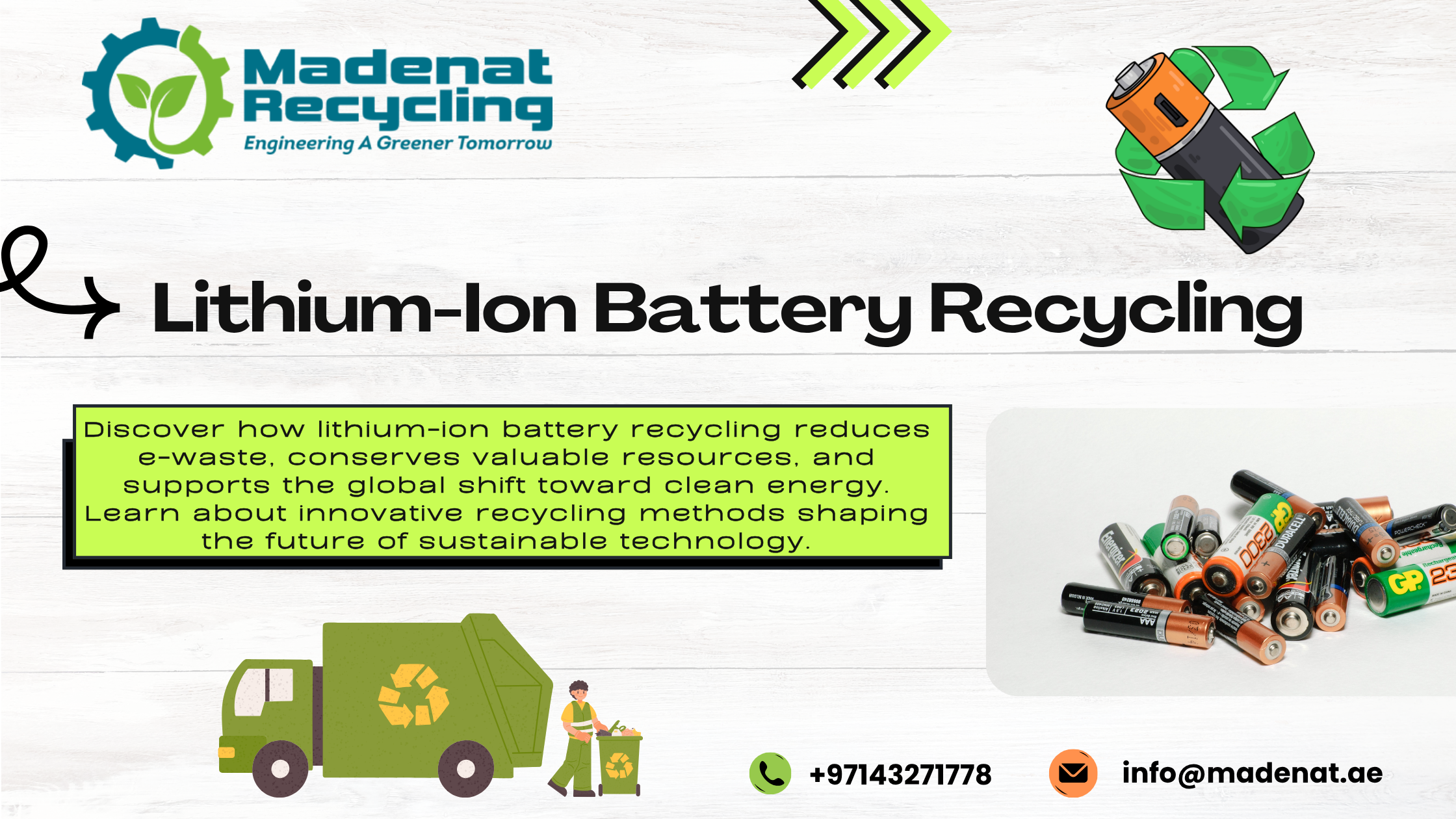Lithium Ion Battery Recycling : A Key to Sustainable Waste Management in the UAE
Lithium ion battery recycling is becoming essential as the use of these batteries skyrockets in consumer electronics, electric vehicles (EVs), renewable energy storage, and more. At Madenat Recycling, we are leading the way in the UAE by offering certified, municipality approved lithium ion battery recycling services that protect the environment, recover valuable materials, and support the country’s sustainability goals.
In this post, we explore what lithium ion battery recycling is, why it matters, how the process works, regulatory context in the UAE, and how you can contribute.
What is Lithium Ion Battery Recycling?
Lithium ion batteries (Li ion batteries) are rechargeable batteries used in many modern devices—smartphones, laptops, power tools, EVs, portable renewable energy systems, etc. They contain valuable and often rare metals such as lithium, cobalt, nickel, and also components like copper, aluminium, separators and electrolytes.
Recycling means collecting used or end of life batteries and processing them so these materials can be extracted, purified, and reused, rather than discarded. Proper recycling also ensures dangerous or toxic parts are handled safely, preventing environmental pollution or safety risks like chemical leaks or fires.
Why Lithium Ion Battery Recycling Matters
1. Environmental Protection Discarded batteries in landfills can leach toxic elements, pollute soil and water, and pose fire hazards. Recycling prevents such risks by safely managing hazardous materials.
2. Resource Conservation Metals like cobalt, nickel, and lithium are finite and costly to mine. Recycling reduces dependence on mining and helps supply critical raw materials.
3. Circular Economy & Sustainability Goals In the UAE, sustainability is a high priority. Initiatives like Net Zero by 2050 and the Circular Economy Policy 2021 2031 emphasize reducing waste, increasing resource reuse, and lowering emissions. Lithium ion battery recycling directly supports these goals.
How Lithium Ion Battery Recycling Works (Step by Step)
At Madenat Recycling, we follow a thorough, certified process to safely recycle lithium ion batteries. Here’s a general overview:
- Battery Collection & Sorting: We collect batteries from households, industries, EVs, electronics manufacturers, etc. Batteries are sorted by type, size, chemistry, and condition.
- Discharge: Batteries are safely discharged to eliminate stored energy, reducing fire or explosion risks.
- Dismantling / Disassembly: Batteries are dismantled; components like metal housing, electrodes, separators are separated.
- Extraction of Metals (Copper, Aluminium, etc.): Through mechanical and chemical processes, metals are separated and collected.
- Recovery of ‘Black Mass’: Black mass is a product containing lithium, cobalt, nickel and other critical metals extracted from shredded electrode material. This material is processed for refining.
- Purification & Refinement: The extracted materials are purified to meet quality standards for reuse.
- Quality Control & Compliance: Quality Control & Compliance Ensuring all materials are handled under UAE environmental and safety regulations. Outputs are tested for safety and usability.
- Extraction of Metals (Copper, Aluminium, etc.): Through mechanical and chemical processes, metals are separated and collected.
Lithium Ion Battery Recycling in the UAE: What Is Changing & What to Know
Approved recycling centers, compliance with Dubai Municipality regulations, and certified handling & safety procedures are essential. Madenat Recycling is municipality approved and adheres strictly to local and federal regulatory standards.
How You Can Help – What Madenat Recycling Offers
At Madenat Recycling, we accept a wide variety of lithium ion batteries, such as:
- Mobile phones, tablets, laptops
- Electric vehicle (EV) batteries
- Power tools & portable electronics
- Renewable energy storage systems
We also accept other battery types (NiCd, UPS, alkaline, etc.). Our services include:
- Safe collection & drop off
- Certified, approved recycling & disposal
- Extraction & recovery of valuable materials
- Ensuring minimal environmental footprint
If you have used or damaged batteries, avoid disposing of them in regular trash. Contact us, follow safe storage and drop them off at our facility. By doing so, you help preserve health & environment, and support resource efficiency.
Frequently Asked Questions (FAQs)
Can lithium ion batteries be fully recycled?
While “fully” is ambitious, modern advanced recycling processes can recover a very large proportion of the valuable materials—often 95% or more. Some minor losses may occur depending on battery type.
Is recycling cost effective?
As technologies and scale improve, the cost per unit recycles is decreasing. Also, the savings from avoided environmental damage and reduced mining make it worthwhile.
What happens to damaged or end of life EV batteries?
They go through the same certified collection, discharge, disassembly, and recovery process. Madenat can handle industrial scale battery waste responsibly.
Conclusion
Lithium ion battery recycling isn’t just a good idea—it’s necessary for sustainable development, environmental protection, and achieving the UAE’s green goals. At Madenat Recycling, we’re committed to being part of the solution. From household electronics to industrial battery packs, we provide safe, certified, and efficient recycling services that recover valuable materials and help reduce environmental impact.
If you want to learn more or arrange battery pickup or drop off, get in touch or visit our facility. Let’s power a sustainable future together—one battery at a time.
